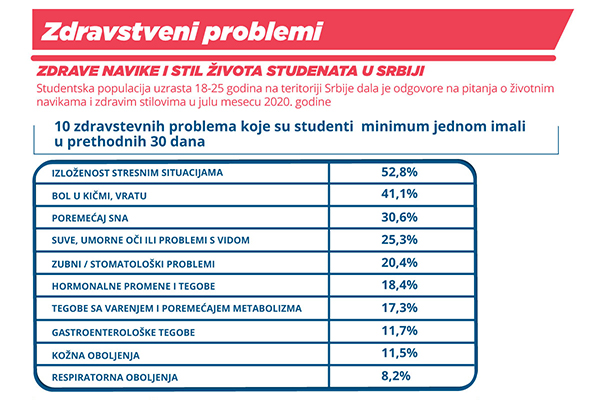
Galenika Research: Stress, spinal and back pain and sleep disorders are three most common health problems of students in Serbia
Belgrade, September 24, 2020 – Galenika has launched a research on everyday habits and healthy lifestyles among students, according to which almost 53% of students in Serbia state exposure to stressful situations as the biggest health problem. Other commonly cited health problems are spinal and back pain (41%), while sleep disorders are the biggest problem for almost a third (31%) of students.

Other problems that plague students are various problems with eyes and vision 25.3%, then hormonal problems 18.4%, while in fifth place problems with digestion and metabolism are present with 17.3% of students. In June 2020, about 40% of respondents regularly added vitamin C to their diet, 30% ingested supplements with minerals, and a quarter took various vitamins, with the goal of strengthening the body’s immunity.
“Physical and mental health are the basis of personal well-being which affects our interaction with others, but also how we affect everyone and everything around us. Therefore, it is important to inform and educate students about healthier lifestyles that will contribute to improving their overall mental and physical health, especially during the academic year when they certainly feel the greatest pressure”, said Ricardo Vian Marques, General Manager of Galenika and added: “The research which we conducted confirmed to us that students represent a group that is very vulnerable in terms of physical and mental health, which is a topic that we need to commit together, because prevention is very important in that age.”

Additional insights:
One third of Serbian students are exposed to a mobile phone screen for up to 5 hours a day
While young people said that less than ten percent (9.4%) watch television for more than three hours, the results show that respondents of the age spend the most time in active smartphone use: 41.5% use mobile up to 3 hours a day, a third of respondents (33.5%) up to 5 hours a day, and 16% even more than 5 hours /day. The situation with computers and tablets additionally indicates the popularization of mobile multifunctional devices: 28.5 percent of young people use them for more than 3 hours per day.
Help and support
Taking care of one’s own health includes prevention, but also the possibility of turning to adequate institutions and experts who can provide help and advice to students if they have any doubts or questions. The results of the research showed that young people do just that, so when asked who they turn to first, if they have a certain problem, 26.8% of them said that they seek advice from a doctor, then parents a quarter, and friends 17.6%, while Google is the source of information for 16.3%.
The WHO believes that the prevention of chronic non-communicable diseases is a vital and most important investment in society, especially among the younger population to build positive and healthy habits, which is an important task at all levels of society, and joint efforts show the best results.
Leave a reply